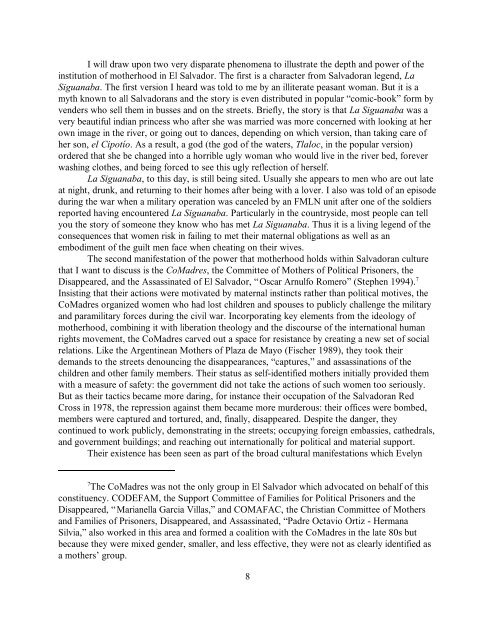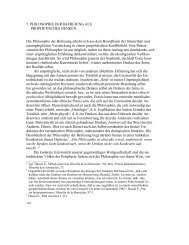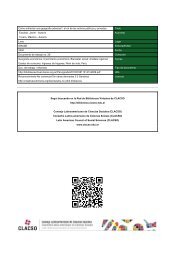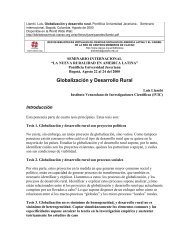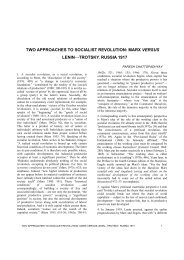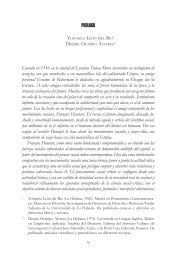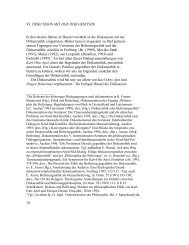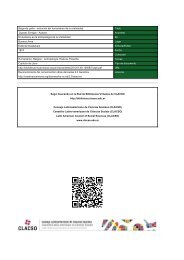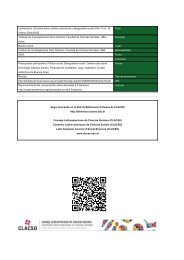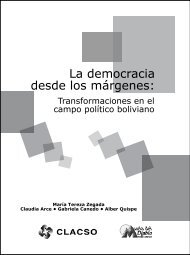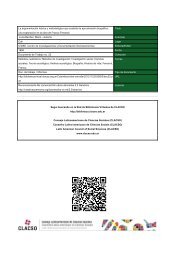Draft Papi, te necesito: Paternidad Irresponsable, La ... - CLACSO
Draft Papi, te necesito: Paternidad Irresponsable, La ... - CLACSO
Draft Papi, te necesito: Paternidad Irresponsable, La ... - CLACSO
You also want an ePaper? Increase the reach of your titles
YUMPU automatically turns print PDFs into web optimized ePapers that Google loves.
I will draw upon two very dispara<strong>te</strong> phenomena to illustra<strong>te</strong> the depth and power of the<br />
institution of motherhood in El Salvador. The first is a charac<strong>te</strong>r from Salvadoran legend, <strong>La</strong><br />
Siguanaba. The first version I heard was told to me by an illi<strong>te</strong>ra<strong>te</strong> peasant woman. But it is a<br />
myth known to all Salvadorans and the story is even distribu<strong>te</strong>d in popular “comic-book” form by<br />
venders who sell them in busses and on the streets. Briefly, the story is that <strong>La</strong> Siguanaba was a<br />
very beautiful indian princess who af<strong>te</strong>r she was married was more concerned with looking at her<br />
own image in the river, or going out to dances, depending on which version, than taking care of<br />
her son, el Cipotío. As a result, a god (the god of the wa<strong>te</strong>rs, Tlaloc, in the popular version)<br />
ordered that she be changed into a horrible ugly woman who would live in the river bed, forever<br />
washing clothes, and being forced to see this ugly reflection of herself.<br />
<strong>La</strong> Siguanaba, to this day, is still being si<strong>te</strong>d. Usually she appears to men who are out la<strong>te</strong><br />
at night, drunk, and returning to their homes af<strong>te</strong>r being with a lover. I also was told of an episode<br />
during the war when a military operation was canceled by an FMLN unit af<strong>te</strong>r one of the soldiers<br />
repor<strong>te</strong>d having encoun<strong>te</strong>red <strong>La</strong> Siguanaba. Particularly in the countryside, most people can <strong>te</strong>ll<br />
you the story of someone they know who has met <strong>La</strong> Siguanaba. Thus it is a living legend of the<br />
consequences that women risk in failing to met their ma<strong>te</strong>rnal obligations as well as an<br />
embodiment of the guilt men face when cheating on their wives.<br />
The second manifestation of the power that motherhood holds within Salvadoran culture<br />
that I want to discuss is the CoMadres, the Commit<strong>te</strong>e of Mothers of Political Prisoners, the<br />
Disappeared, and the Assassina<strong>te</strong>d of El Salvador, “Oscar Arnulfo Romero” (S<strong>te</strong>phen 1994).<br />
Insisting that their actions were motiva<strong>te</strong>d by ma<strong>te</strong>rnal instincts rather than political motives, the<br />
CoMadres organized women who had lost children and spouses to publicly challenge the military<br />
and paramilitary forces during the civil war. Incorporating key elements from the ideology of<br />
motherhood, combining it with liberation theology and the discourse of the in<strong>te</strong>rnational human<br />
rights movement, the CoMadres carved out a space for resistance by creating a new set of social<br />
relations. Like the Argentinean Mothers of Plaza de Mayo (Fischer 1989), they took their<br />
demands to the streets denouncing the disappearances, “captures,” and assassinations of the<br />
children and other family members. Their status as self-identified mothers initially provided them<br />
with a measure of safety: the government did not take the actions of such women too seriously.<br />
But as their tactics became more daring, for instance their occupation of the Salvadoran Red<br />
Cross in 1978, the repression against them became more murderous: their offices were bombed,<br />
members were captured and tortured, and, finally, disappeared. Despi<strong>te</strong> the danger, they<br />
continued to work publicly, demonstrating in the streets; occupying foreign embassies, cathedrals,<br />
and government buildings; and reaching out in<strong>te</strong>rnationally for political and ma<strong>te</strong>rial support.<br />
Their exis<strong>te</strong>nce has been seen as part of the broad cultural manifestations which Evelyn<br />
7<br />
The CoMadres was not the only group in El Salvador which advoca<strong>te</strong>d on behalf of this<br />
constituency. CODEFAM, the Support Commit<strong>te</strong>e of Families for Political Prisoners and the<br />
Disappeared, “Marianella Garcia Villas,” and COMAFAC, the Christian Commit<strong>te</strong>e of Mothers<br />
and Families of Prisoners, Disappeared, and Assassina<strong>te</strong>d, “Padre Octavio Ortiz - Hermana<br />
Silvia,” also worked in this area and formed a coalition with the CoMadres in the la<strong>te</strong> 80s but<br />
because they were mixed gender, smaller, and less effective, they were not as clearly identified as<br />
a mothers’ group.<br />
8<br />
7


